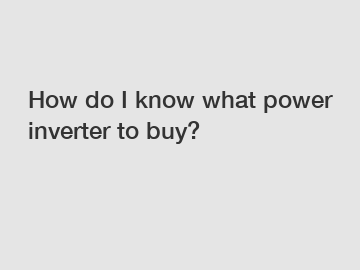How do I know what power inverter to buy?
How Do I Know What Power Inverter to Buy?
When it comes to purchasing a power inverter, many people find themselves confused and overwhelmed by the variety of options available in the market. A power inverter is an essential device that converts direct current (DC) from a battery or solar panel into alternating current (AC) that can power various electronic devices. To ensure that you make the right decision and purchase the appropriate power inverter for your needs, there are several key factors to consider.
1. Power Requirements:

The first step in determining what power inverter to buy is to assess your power requirements. Determine the total wattage of the devices you intend to connect to the inverter simultaneously. This will help you understand the size and power capacity you need in an inverter. It is crucial to choose an inverter that can handle the combined wattage of all your devices to avoid overload or damage.
2. Sine Wave Type:
Consider the sine wave type produced by the inverter. Pure sine wave inverters generate a smooth and reliable output, similar to the electricity supplied by utility companies. These are suitable for powering sensitive electronics like medical equipment, laptops, and televisions. Modified sine wave inverters, on the other hand, produce a slightly distorted wave and may not be compatible with some devices. Understanding the requirements of your devices will help you determine the appropriate sine wave type for your power inverter.
3. Inverter Size and Portability:
Another factor to consider is the size and portability of the inverter. If you plan to use it in a stationary location, such as a home or office, a larger and heavier inverter may be acceptable. However, if you require a power inverter for outdoor activities or to use while traveling, a compact and portable option is recommended. Ensure that the inverter you choose suits your specific needs and can be easily transported or mounted if necessary.
4. Battery Requirements:
Check the battery requirements of the power inverter to ensure compatibility with your existing setup. Some inverters are designed to work with specific battery types, such as lead-acid or lithium-ion. Additionally, consider the battery capacity required to power your devices for the desired duration. If you require longer backup times, it is important to select an inverter that can support larger battery banks.
5. Safety Features:
Safety features are crucial when dealing with electrical equipment. Look for power inverters that include features such as overload protection, short circuit protection, and low battery alarm/shutdown. These features serve to protect both your devices and the inverter itself during operation. Additionally, consider inverters that have a built-in cooling system to prevent overheating.
6. Brand Reputation and Customer Reviews:
Considering the reputation of the brand and reading customer reviews can provide valuable insights into the quality and reliability of the power inverter you are considering. Look for feedback on the inverter's performance over time, durability, and the level of customer support offered by the manufacturer.
In conclusion, when purchasing a power inverter, it is crucial to assess your power requirements, consider the sine wave type, evaluate the size and portability, check the battery requirements, examine the safety features, and research brand reputation and customer reviews. By carefully considering these factors, you can ensure that you buy the most suitable power inverter for your needs, providing a reliable and efficient power source for your electronic devices. So, before making your purchase, take the time to do your homework and find the power inverter that best meets your specific requirements.
Want more information on 3 phase inverters, three phase inverter, single phase and three phase inverter? Feel free to contact us.


